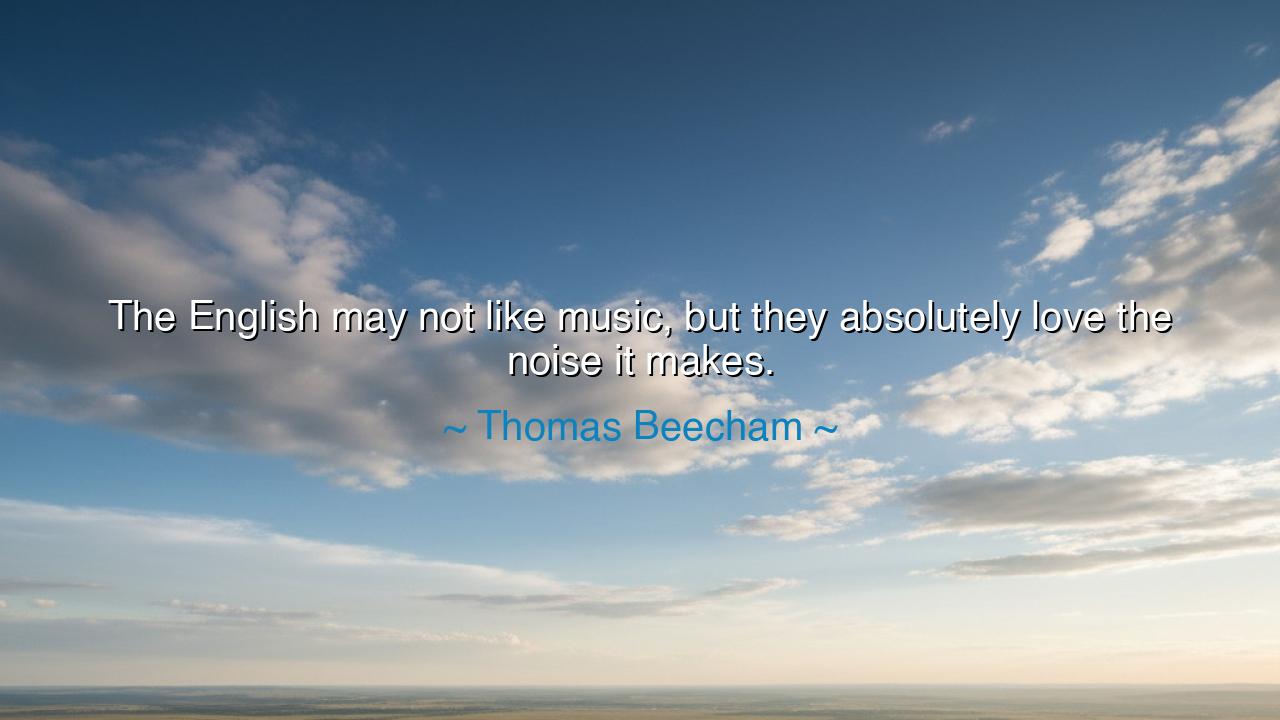
The English may not like music, but they absolutely love the






Hear now the biting yet playful wisdom of Sir Thomas Beecham, who declared: “The English may not like music, but they absolutely love the noise it makes.” Spoken in jest, yet wrapped in satire, these words hold more than humor. For within them lies a mirror of the human condition: the difference between loving essence and loving appearance, between cherishing true art and delighting merely in its glittering echo. Beecham, himself a conductor who knew the power of sound, spoke with irony to awaken thought. He knew that a people may gather to applaud music, yet often it is not the depth of harmony they revere, but the spectacle, the noise, the social glitter of the occasion.
The first truth in his saying is this: many embrace not the heart of art but the surface of its power. To love music is to seek the spirit within it, to feel the discipline of melody, the architecture of harmony, the silence that cradles each note. But to love the noise it makes is to hunger only for the sensation, the crowd, the stir of sound that fills the air. Thus Beecham warns us—are we lovers of music, or only of its shadow? Do we love beauty itself, or only the fleeting excitement it causes?
Consider the Roman amphitheaters of old. The crowd cheered not for the subtle rhythm of the gladiator’s movements but for the roar, the blood, the spectacle of the noise. The artistry of combat was often lost to the thunder of the masses. So too with music, and with all art: when the people hunger only for noise, they miss the depth of the song. Beecham, with his tongue sharp as a blade, reminded his listeners that culture without comprehension is hollow.
History offers us another tale: when Richard Wagner’s works first spread across Europe, many came not for the profound philosophy of his compositions but for the grandeur of the orchestra, the pounding of drums, the sweeping noise of the brass. They were stirred, yes, but few grasped the ideas of myth, redemption, and destiny hidden beneath. In time, some would learn to cherish the true substance; others would remain content with the thunderous clamor. Thus, the wisdom of Beecham’s jest reveals itself again—too many love not music, but the noise it makes.
What lesson, then, can we draw? It is this: in life, beware the temptation of noise. Not only in music, but in all things—words without wisdom, appearances without depth, movements without meaning. True value is not in the glitter, but in the essence. Just as fine music reveals its beauty to the patient ear, so too does truth reveal itself only to the patient soul. To love only the noise is to live shallowly; to love the music itself is to live deeply.
Practical wisdom follows: listen more carefully—not only to songs, but to people, to silence, to the world around you. When you are moved by something, ask yourself: Do I love its essence, or only its noise? Seek the core, the meaning, the discipline behind the spectacle. Read not just the words, but the intent of the writer. Hear not just the sound, but the heart of the musician. Value not only the applause, but the work that made it possible.
Thus, remember Sir Thomas Beecham’s witty rebuke: “The English may not like music, but they absolutely love the noise it makes.” Take it as a parable for your own path. Do not be one who loves only the noise—whether in art, in speech, or in life. Instead, train your heart to love the music itself: the harmony beneath the sound, the truth beneath the show, the soul beneath the form. For those who love the essence walk the higher path, and leave behind not noise, but legacy.






AAdministratorAdministrator
Welcome, honored guests. Please leave a comment, we will respond soon